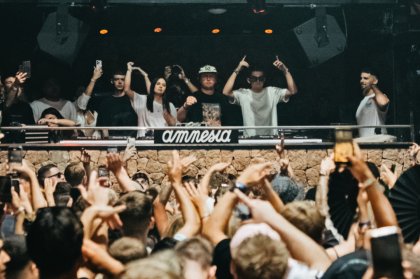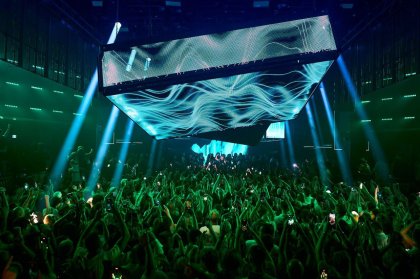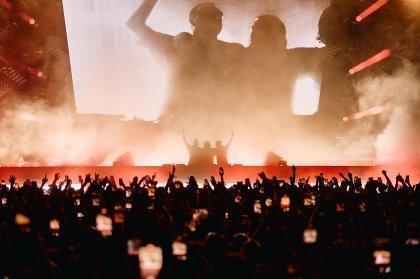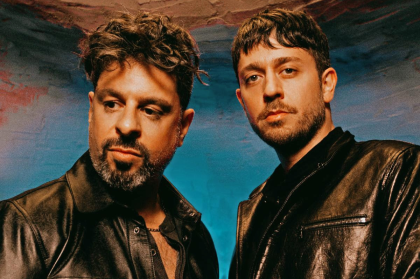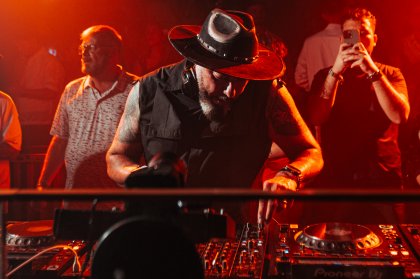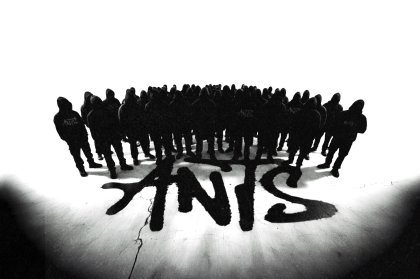If you've ever visited Privilege on one of the big nights, a Manumission or a Supermartxe, it's hard to believe that such a monstrous clubbing destination could have been spawned from a simple swimming pool and restaurant space.

Ku in the 1970s with the distinctive swimming pool area



Entrance stairs at Ku, still in the same place today

Ku's pool had a water slide that later turned into a dragon!
Throughout the 1970s, this place was inland sea of tranquility and haunt for locals and those in the know around Sant Rafel, with pratically no hint at the pizzazz that was to follow. In many ways, the contrast with what has happened since, represents the classic scenario of the conflict between those bygone, old Ibicenco memories - that lovers of the island both search and cherish - and the things and events that superseded them....and in the process lead to the reason why many of us are here today.
Possibly the biggest single factor in the subsequent history of Ku occurred at the end of the 70s, when Basque entrepreneur and former Real Sociedad footballer, Jose Antonio Santamaría, expanded his Ku franchise from an existing Ku club in San Sebastian. From here, spontaneous parties began and a culture of high fashion, hedonism and excess spiralled Ku into the 1980s where it garnered fame as arguably the most reputed nightclub in the world. Amongst those in the know, it certainly picked up where Studio 54 had left off - after it's demise in the early 80s - as the playground of the rich and famous.
Alongside Santamaría, Brasilio de Oliviera (founder of La Troya) and Gorri were two of the most influential parts of the creative machine in the early parties. The party concepts and fiestas that now typically form part of the La Troya season were born at Ku during the 80s; White Full Moon, Babylonia, The Temple of Love, Hell, Prison, as well as parties celebrating the 4 elements, the 4 seasons, parts of the body or specific inspirational places like Goa or Africa. Ku also held children's parties, Somos Como Niños (Translation: We're like Kids), which Brasilio would also later use as a theme for La Troya fiestas.

Santamaria (all green), Faruk (all blue) and Brasilio (far right).

Faruk (far left) Brasilio (far right) and Gorri (centre), the driving force behind Ku in the 80s.

Somos Como Niños Party.

Just another day in the wonderful world of Ku.
During the 80s, Ku was mobbed by fashionistas and popstars, you almost know the names before you've heard them; Roman Polanski, Grace Jones, Freddie Mercury and designers like Valentino, Moschino and Gaultier. The swimming pool area and small bar by now had a proper discoteca and various bars dotted around the complex, many in the same place they are today, such as the Coco Loco and the bars in the gardens. The white arched frames holding the club's canopy (as seen in the photos below) is still very much part of the integral design and structure of the current club, most noticeably in the restuarant area, Coco Loco and La Vaca.

Roman Polanski at Ku in 1984.


Note the pyramid like construction in the background (right), covering the space known as La Vaca.

The pyramid under construction.

Aerial cartoon/shot of Ku emphasising the open air nature and canopies. The footprint of the club has hardly changed.
Whilst neighbour Amnesia went on to gain particular notoriety thanks to DJ Alfredo's sessions - and the adventures of the famous London boys (Oakenfold, Rampling, et al) - Ku was always something slightly different. The dimensions have long been a key factor, open air or with roof, this location is vast and dwarfs anything that even Ibiza has to offer. It combines the maze like layout and hidden corners of Pacha, with the decadent, botanical feel of Es Paradis. In its heyday, not even Pacha could compete with the way it attracted the celebrities. Freddie Mercury and Montserrt Caballe famously filmed the video for their anthem 'Barcelona' here in 1987.
The beginning of the end, in many ways, came towards the end of the 80s just as the dance music scene really exploded in the UK and other parts of Europe. Compelled to put a roof on the building by local authorities to comply with sound restrictions, the cost of such a task proved too heavy a weight to bear and crippled Santamaría and his Ku associates, particularly after the initial installation collapsed in 1990. Santamaría was then implicated in a big narcotics case that was being investigated at the time and although never proven guilty, he found himself ever more deeply embroiled in allegations and the political games of chess surrounding it. His political ties, combined with previous fame as a local footballer and renowned businessman, made him a target for ETA and he was eventually assasinated in 1992 in his home town of San Sebastian.
Ku, now with permanent roof structure, entered a purgatory-like period in the early part of the 90s when everything that had represented what Ku was about slowly disappeared and the electronic music revolution quickly gathered pace. Ironically, many of changes that spelled the end for Ku, evolved into the iconic symbols in the new era of the club and the arrival of foreign promoters to the venue. Most specifically, the perhaps-ghastly looking, but grandiose and breathtaking huge fans located at the back of the club, stood as testament to the scale of the place and are certainly the first thing I remember seeing upon entering the club for the first time.

Fans under construction at Ku in 1990.

Redevelopemnt of Ku in 1990.
By the early to mid-90s, British promoters particularly had invaded the island and Ku was one of the most popular destinations for their parties; Manumission, most notoriously from 1994, as well as Cream, who did many of their early events here. As late as 1995, the club was still known as Ku before the name change to Privilege the same year, the anglicised name giving no hint to the Basque origin of new owner, Jose María Etxaniz.
The 90s, mainly thanks to Manumission, rocked as hard as they could given the circumstances. There was no more open air set-up and there were lots more people - never has there been more people at this place than for Manumission in the late 90s - but the hedonism and excess and wild nature of what had gone before, continued. It wasn't just the sex show, which the Mish became most famous for, it was the outlandish production and costumes, the other worldly themes, it was Fatboy Slim DJing in the toilet, it was the fact the toilets had a DJ at all, it was the Coco Loco madness till 9 or 10am. In those morning hours, there may have been a roof on the place, but as the sun streamed through the windows of the Coco Loco and then the Main Room, the spirit of Ku was alive.....and kicking like a bastard!
The story since is too contemporary for us to continue here, a huge screen for projections has replaced the 25m windows at the back of the Main Room that allowed the sun to radiate through in the mornings. The sun isn't even up sometimes by the time the club closes these days. The historical footprints of Ku are everywhere in Privilege; the basic layout, the garden areas and the Coco Loco, the swimming pool still adorned with Ku under it's water and perhaps most potently, the statue of Ku - the ancient Hawaiian God - whose presence still guards over the fiction-like history of the club.

Manumission took the Ku story to new levels.

Ku God today (see if you can find him in the club).

Modern day Privilege with it's huge roof - pyramid still there at far right)
Further Reading/Viewing
Ku Ibiza Best Years - Lots of new updated photos!
Facebook Group - Have you ever been to Ku (Lots of photos)
Facebook Group - Ku 1978-1990 - The Best Years (Tons of photos and flyers)
Videos of Ku/Privilege down the years:
A Short Film About Chilling (1990 Documentary - Channel 4 UK)
